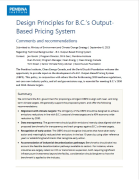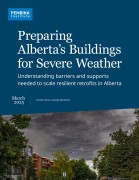
April 26, 2011
The Honourable Christy Clark
Premier of British Columbia
Box 9041, Station Provincial Government
Victoria, British Columbia
V8W 9E1
Dear Premier Clark,
During your leadership campaign, you committed to continue reducing carbon emissions and aggressively establish B.C. as a leader in clean energy. We support both of these objectives and urge you to make them priorities of your government.
You have also clearly stated the importance of putting families first in the actions your government takes. Families and communities will benefit greatly if we accelerate B.C.'s efforts to spur investments in clean energy, reduce the pollution that causes global warming, and protect the ecosystems needed to adapt to a changing climate. Those benefits include:
- A natural environment with the scale, resilience and biodiversity that are part of B.C.'s identity.
- A provincial economy that is prepared to compete in a low-carbon world and create long lasting jobs for British Columbians throughout the province.
- Healthy and vibrant communities that provide safe and convenient transportation options, and comfortable, energy-efficient homes and buildings.
- A province where more people find ways to use less and cleaner energy, and are able to spend their money on things that are more important than energy.
Decisive action is needed if B.C. is going to realize these benefits. The scale and urgency of the global warming challenge make it clear that resting on past accomplishments will not be sufficient. We need to continue forging ahead with the steps in B.C.'s Climate Action Plan and other ideas such as the recommendations from the province's Climate Action Team.
To the B.C. government's credit, some of those decisive steps have already been taken. The 2007 decision to ban dirty coal-fired electricity plants and the 2008 implementation of the carbon tax are the most notable, and they provide an excellent foundation to build upon. In combination, these two actions will prevent the release of 4.4 million tonnes of global warming causing pollution, and they have already shifted over $1 billion toward clean energy investments annually.
In terms of next steps, we highlight the importance of continuing to move forward with carbon pricing. Specifically, next steps should include strengthening the carbon tax, implementing our cap-and-trade rules, and working with our partners to build momentum for broader carbon pricing efforts such as the Western Climate Initiative. Doing so will make clean energy solutions like energy efficient homes and electric vehicles increasingly more affordable relative to conventional choices.
Thank you for considering these important solutions. We look forward to working with your government on efforts to reduce the pollution that causes global warming, increase our capacity to adapt to a changing climate, and build a clean energy economy in the province.
Sincerely,
Morag Carter, David Suzuki Foundation, 604.732.4228
Marlene Cummings, ForestEthics, 604.331.6201, ext. 223
Guy Dauncey, B.C. Sustainable Energy Association, 250.881.1304
Andrew Gage, West Coast Environmental Law, 604.684.7378 ext. 206
Stephanie Goodwin, Greenpeace, 604.253.7701 ext. 15
George Heyman, Sierra Club B.C., 604.312.6595
Matt Horne, Pembina Institute, 604.874.8558 ext. 223
Will Horter, Dogwood Initiative, 250.370.9930 ext. 23
Chloe O'Loughlin, Canadian Parks and Wilderness Society, 604.685.7445 ext. 23
Graham Saul, Climate Action Network Canada, 613-241-4413
Christianne Wilhelmson, Georgia Strait Alliance, 604.633.0530
cc
Hon. Pat Bell, Minister of Jobs, Tourism and Innovation
Hon. Rich Coleman, Minister of Energy and Mines, Minister Responsible for Housing Hon. Kevin Falcon, Minister of Finance and Deputy Premier
Hon. Terry Lake, Minister of Environment
Hon. Blair Lekstrom, Minister of Transportation and Infrastructure
Hon. Steve Thomson, Minister of Forests, Lands and Natural Resource Operations
Hon. John Yap, Parliamentary Secretary for Clean Technology








